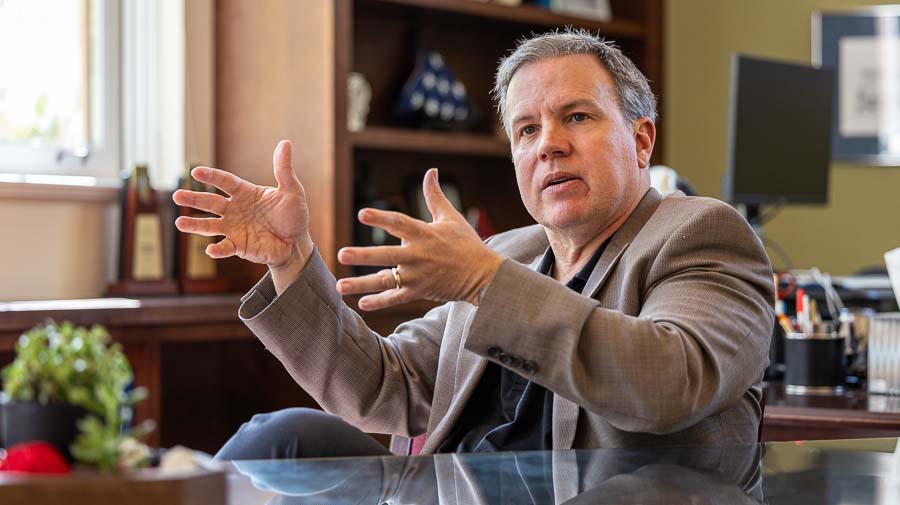SOU President Bailey says $3.3M deficit could lead to dozens of full-time position cuts
Published 9:22 am Wednesday, June 11, 2025
He delivers ‘troubling’ summer sendoff news to staff, faculty, says ‘stark’ financial woes facing Oregon universities in 2025-26 constitute a ‘crisis’
An estimated 5% of Southern Oregon University’s workforce — or the equivalent of up to 35 full-time positions — could be eliminated in the coming fiscal year, due to a projected $3.3 million deficit, Rick Bailey, president of SOU, said in a phone interview with Ashland.news Friday.
The fiscal year 2025-26 budget deficit of $3.3 million, so far $800,000 more than the $2.5 million previously anticipated, could also include cuts to programs as well. While unofficial until this fall, when enrollment numbers are in and the June Legislative session has come to a close, the news could send Oregon down two rankings when it comes to state funding — moving the needle from 44th to 46th in the country for state support for public universities, according to Bailey.
“It’s about as stark of a picture as we can get,” Bailey told Ashland.news of the projected $1.06 billion state Higher Education Coordinating Commission budget. “This is a very tough time — not just for SOU, but for higher education and certainly for public universities.”
It is unclear at this time what positions at SOU could be cut or when, though cuts would likely be made during the 2025-2026 biennium.
“In general, we should be looking at everything,” Bailey said. “There shouldn’t be anything that’s off the table.”
The SOU Board of Trustees has directed SOU to submit a budget for the upcoming fiscal year that avoids draining its already limited fiscal reserves, according to a letter Bailey wrote to staff and faculty, obtained by Ashland.news, meaning initiating a cost-reduction process of staff positions and programming across campus.
“While this reduction isn’t near the $13 million shortfall we navigated during the SOU Forward Plan, this process will be challenging, given workload distribution issues and already leaner program offerings,” Bailey said in a letter to staff and faculty at SOU.
SOU’s budget is always based on a series of variables, Bailey said, with one of the most volatile factors being state funding.
One of the factors that Bailey said the university has been intentionally conservative with has to do with state funding.
Bailey called the variable of the budget related to higher education “utterly flawed,” with students making up two-thirds of the revenues through tuition.
“We are getting a fairly clear indication that the budget for the biennium for the Higher Education Coordinating Commission (HECC) which includes public universities, is going to be around $1.06 billion,” he said. “That doesn’t come close to allowing us to do what we did last year.”
Bailey said he has spoken with Oregon Gov. Tina Kotek (D-OR) about SOU’s financial situation.
“We understand that the governor and our state legislature have far more requests for funding than they have available resources,” Bailey said. “But as a state, we have to see universities as economic prosperity engines, and when we don’t, it’s not just university students who suffer, it’s not just faculty and staff who suffer, it’s Oregonians as a whole who suffer.”
In a letter to faculty and staff at SOU, Bailey spoke about the proposed federal budget passed by the U.S. House of Representatives.
If signed into law, Bailey believes SOU’s ability to serve all students — especially low income — will be “significantly impacted.”
SOU is working to educate the congressional delegation about adverse effects to SOU and its students, according to Bailey.
State Rep. Pam Marsh told Ashland.news in a phone interview Friday that Bailey sent her a letter regarding his concerns about SOU’s financial situation.
Marsh echoed that SOU is in a “very difficult position” with the current budget projection.
“The university has been trying to climb out of a hole and has done a tremendous amount of positive work to do that, and now is going to face another hole because the state just doesn’t have the money to fund it in a robust way,” Marsh said. “The situation at SOU is going to be reflective of many items in our budget. We have a very lean budget and we are extremely concerned about threats from the federal government that may further undermine our safety net.”
On May 15, Marsh said legislators learned of what she describes as a “volatile” economic forecast by Oregon Chief Economist Carl Riccadonna that the state will have $500 million less during the next two-year budget cycle, according to OPB.
“The budget was built on that (forecast),” she said.
Marsh said she and her colleagues understand the vital importance of higher education to the local economy, as well as students and their families.
“This isn’t a matter of lack of appreciation,” Marsh said. “This is really a question of ‘how do we spread the butter across a very big loaf?’ when we don’t have much.”
The university will be accepting submissions over the summer on ways to move forward.
“This is a situation that we will be monitoring daily and it likely will change some between now and the first part of (fall) classes,” Bailey said. “But we can’t wait until then to start and figure out how we might address it. We need to start now and hope that the things that we are exploring won’t all need to be put into place.”
Bailey emphasized that many factors could still influence SOU’s final budget picture.
“In the weeks ahead, I plan to meet with the leaders of our shared governance partners so we can collaboratively address these challenges,” Bailey said in a statement to faculty and staff.
“I want to say a special thanks to all of you who have reached out in the days following the Campus Conversation to ask what you can do to help,” he added.
Bailey encouraged social and emotional wellness and shared tips for staff and faculty to take care of themselves and others.
“After everything we have been through, I know this budget news is incredibly frustrating,” he said. “Please be mindful of your social and emotional wellness, and access the free and confidential services provided by PEBB – Employee Assistance Program. These resources are also available to eligible family members.
“As we approach the end of the fiscal year, departments are asked to preserve any remaining budget they have,” he added. “Reducing end-of-year purchases will have a positive impact.
“We want to hear all ideas that may help us navigate the current crisis together. For example, a suggestion was made to reassess vacant positions and travel, and these are under current review.”
Bailey acknowledged that the university will not be able to solve the current financial scenario, which he described as a “crisis,” in a vacuum.
“The same way we approached SOU Forward, which was a much bigger challenge, we will do this as a team and we will do this through collaboration and creativity,” Bailey said.
Bailey said he’s never had a “honeymoon” period of time since arriving at SOU in 2022, but is committing to facing the financial crisis at hand.
“I realize this is bad timing as we head into summer, but I did not want to wait and have some of you hear about this in September,” Bailey said in a letter to staff and faculty. “Sobering news such as this requires our immediate action. Our priority, as always, is to work together as a team. There is no doubt that this news is difficult; however, we have overcome previous challenging times together. Please know that I reaffirm my commitment that every decision we make will reflect our shared love for SOU, each other and our students. When we keep those things as our North Star, there is no obstacle that we cannot overcome. Thanks, everyone.”
Bailey emphasized transparency with staff and faculty, even if that means sharing tough news prior to a usually optimistic week leading up to commencement on June 14.
“What we need to do as a SOU family is make sure that we are being open and honest with all of our team members and I don’t want anyone leaving for the summer without at least understanding the challenges that we are facing because of the lack of prioritization coming from the state and federal governments,” Bailey said.
“This next week is all about celebrating,” Bailey added. “It’s about celebrating our graduates, it’s about celebrating our faculty and staff, it’s about celebrating our community, so we need to do both at the same time, to be open to the challenges that we face, but celebrate the goodness that we have and recommit ourselves to working to figure out solutions for moving past these obstacles and we will.”
SOU is asking for ideas on next steps using this form (click here) and/or to speak directly with shared governance representatives, who will continue to engage with the university’s leadership team throughout the cost reduction process.
Email Ashland.news staff reporter Holly Dillemuth at hollyd@ashland.news. This story first appeared at Ashland.news.






